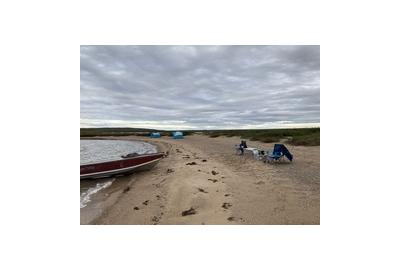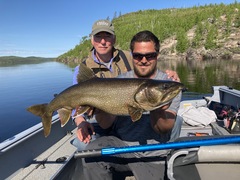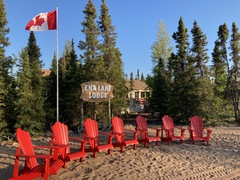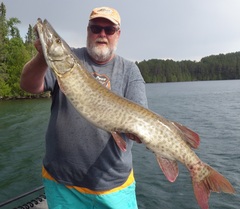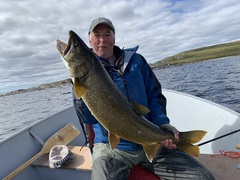I recently returned from a self-guided fishing trip to a vast lake in the Northwest Territories. There is a lodge on the lake, but a friend and I made an arrangement with the owner to rent a boat, motor and fuel and head out on our own for eight days. We explored the lake from end to end and didn’t see another boat or person until our return. The weather was unseasonably windy and cool - in fact we were completely windbound one day - limiting the hours we could fish, but we managed to hook into enough lake trout and grayling to keep us well-fed and well-entertained. Each day we set up our tent on whatever beach we could find and, with no fuel-supplying trees on the tundra, cooked over a stove each evening. Over the week we saw caribou, muskox, Arctic wolves, foxes, peregrine falcons, Arctic loons and a host of other plants, mammals and birds not found elsewhere. In short, it was a wonderful experience, and one that wouldn’t have been duplicated had we opted for the guided fishing experience offered by the lodge. That’s one of the benefits of do-it-yourself angling - you get to set your own agenda.
DIY means fishing how, where and when you want.
Over the years I’ve had the privilege of fishing with guides numerous times, and I couldn’t begin to count the number of self-guided days I’ve enjoyed over the years. Both have their benefits, and their liabilities, and it pays to think carefully when deciding which is right for you.
Guided Fishing
The obvious benefit to a guided fishing trip is that you’ll be introduced to the water, the tackle, the tactics and the fish themselves by someone who has local knowledge and experience. This can save you days and potentially thousands of dollars versus the DIY, trial and error approach. Make no mistake, guiding is a professional occupation, and the good ones go to great lengths to ensure you’re successful; like most businesses, they depend highly on repeat clientele.
Most guides are professionals who want you to be successful.
Some guided angling is conducted as day trips, where you meet your guide in the morning at a prearranged location and fish the day with them. Once you hit the dock at the end of the day, you’re on your own. Other guides, meanwhile, work out of lodges that also provide meals and accommodations. Each has its place.
So when should you consider a guided versus a DIY excursion? First and foremost is when you want to fish remote locations where there’s no easy access. This is the case for most northern lodges where the only way to get there is to fly in. These are vacations in their truest sense, where fishing is often the only available activity. In nearly all cases you’ll be provided accommodations and meals as well. Many are surprising affordable and offer a great way to spend time with family or friends with minimal responsibilities other than to enjoy yourselves.
Lodge experiences usually include meals, accommodations and guided fishing.
Another situation where a guided trip is warranted is when the equipment requirements are beyond your capabilities. Want to go fishing for Pacific salmon? Unless you have a substantial boat and the specialized rods, reels and lures required, a guided trip is definitely the way to go.
It also makes sense to hire a guide as a quick way to learn new water, or fish for a new species. Say, for example, you’re a first-timer in the Calgary area and want to fish the renowned Bow River. There’s lots of information to be found in tackle shops and online, but hiring a guide for a day or two will shorten the learning curve immensely. A guide will teach you how and where to look for fish, and what tackle and technique to use under a variety of conditions. After a day or two of guided angling, you’ll be much more prepared to fish the Bow on your own.
When you’re fishing for a new species or in new waters, hiring a guide can shorten the learning curve.
Limited time provides another valid reason for hiring a guide. If your life commitments limit the time you have to fish, using the services of a guide goes a long way to ensuring what little fishing time you have is productive.
DIY
Most of us fish without the help of a guide the vast majority of the time. It allows us to fish where we want, when we want and how we want. We have the gear required to be successful, and likely have some familiarity with the water, the species were targeting, and the presentations required to be effective.
DIY fishing also facilitates experimentation. When you want to explore a hidden stream or try a new lure, there’s nothing better than simply getting out and having fun with a buddy or on your own. Plus, there’s something about discovering success on your own terms that makes it that much more rewarding.
A self-guided trip this summer led to some great lake trout angling.
Of course, DIY fishing requires that you have the requisite tools, and that can mean significant investment in boats, motors, electronics and tackle. But remember, if you maintain your gear properly it can last a lifetime and over the long haul will prove to be worth every nickel. Not to mention, knowing there’s a new rod or reel coming at the end of the week makes working just a little more tolerable.
Combo Fishing
There are times when guided and DIY fishing work in harmony. Earlier this year my wife and I travelled to the Bahamas where, along with enjoying the sun, we wanted to fly-fish for bonefish. Not knowing much about how or where to find them, we hired a guide for a day and a half, then fished on our own for four days. What we learned from our guide served us well, and we were able to find, hook and land several bones on our own, which would have been very unlikely had we not hired a guide first.
My wife and I hired a guide in the Bahamas to teach us the basics, and then went bonefishing on our own.
Summary
In our seemingly ever-busier lives, time to fish has become an increasingly limited commodity. Ironically, though, it’s when we’re busiest that we most need the soothing benefits fishing offers. As you plan your precious fishing time, weigh all the costs of time, travel and the experience you’re seeking. You’ll find that while DIY angling is the best choice most often, there will be times when using the services of a guide is the better option.

